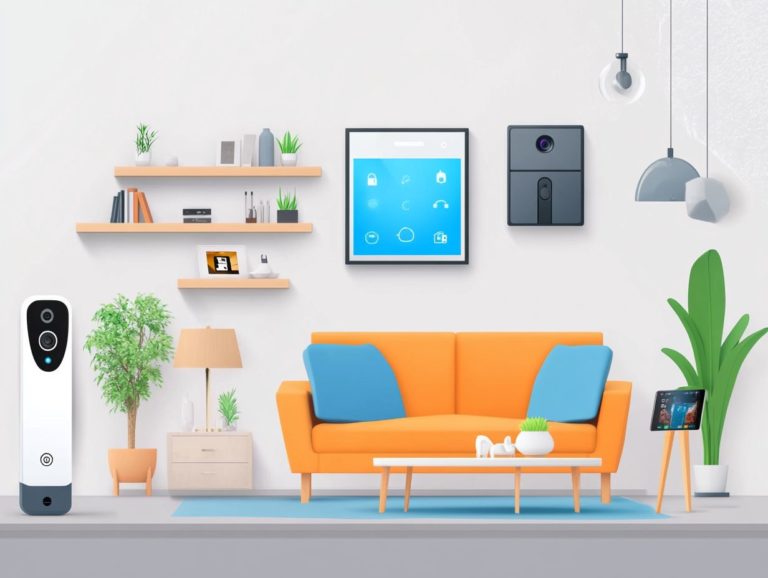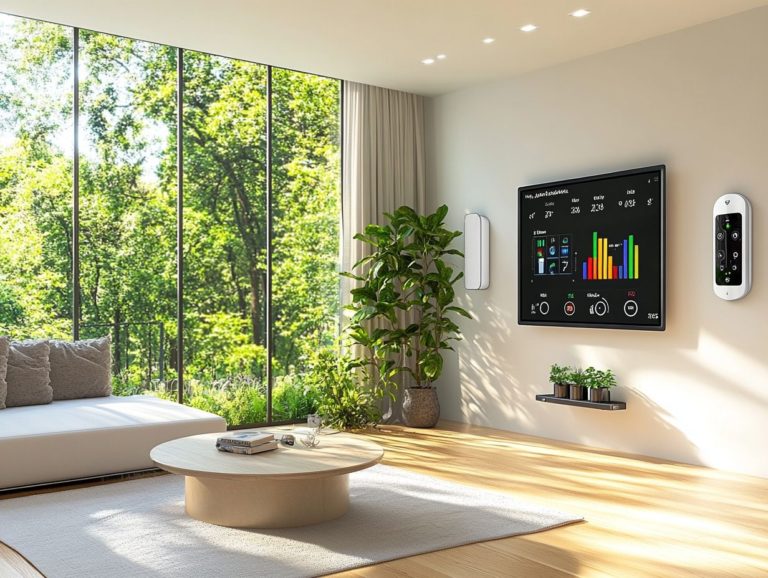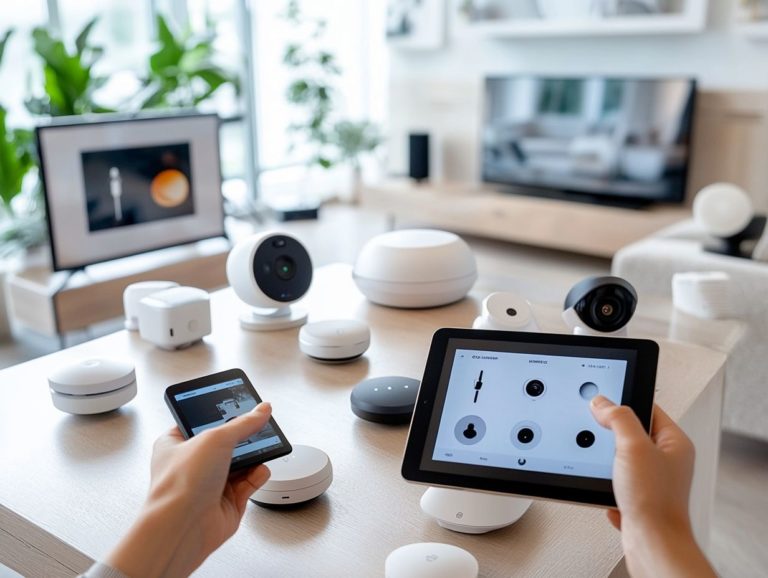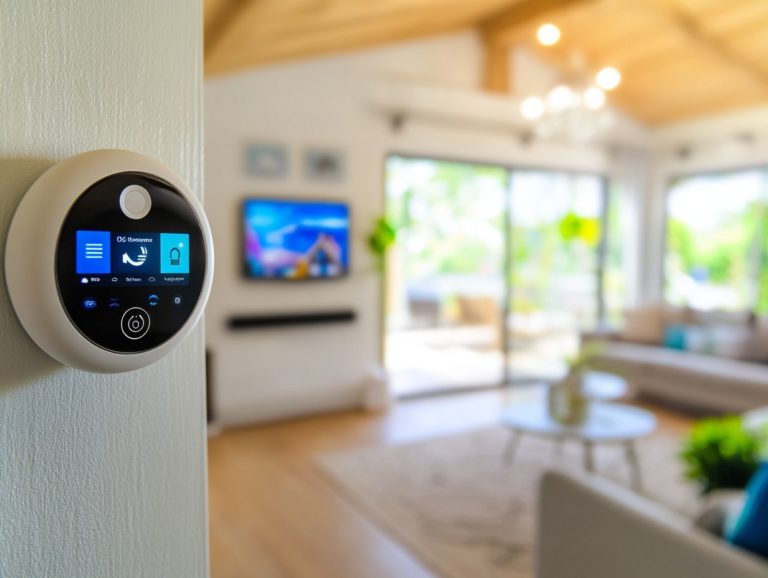How to Choose Smart Home Devices
In today s fast-paced world, smart home devices are revolutionizing your daily life, delivering unmatched convenience and efficiency.
Imagine smart speakers that respond eagerly to your voice commands. Intelligent thermostats learn your preferences over time.
Selecting the right devices may feel overwhelming. There are countless options at your fingertips. This article delves into the numerous benefits of smart home technology, highlights key factors to consider before making a purchase, and showcases various types of devices that can elevate your living space.
Dive in and discover how to create a smarter, more connected home that works for you!
Contents
Key Takeaways:
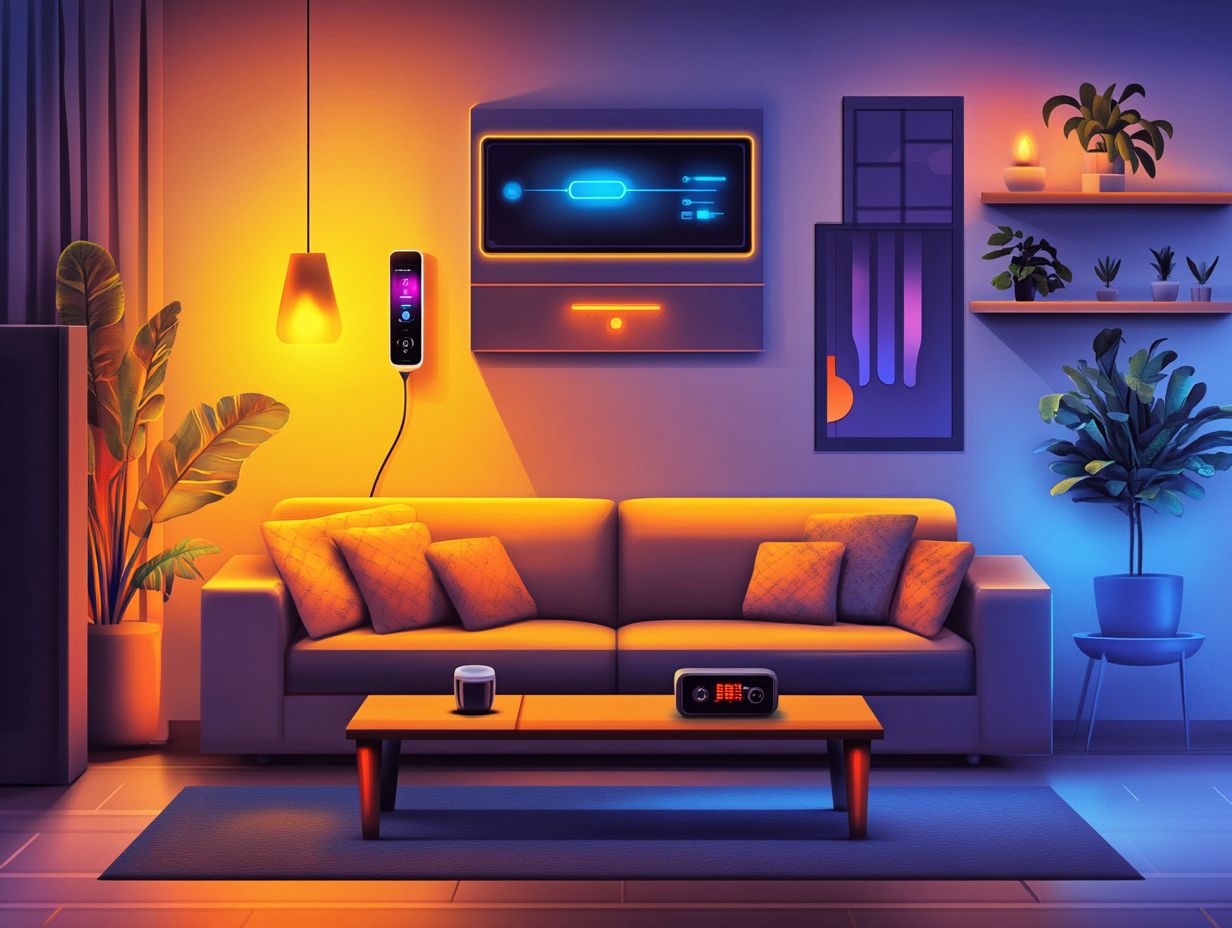
When choosing smart home devices, consider compatibility with existing systems to ensure they work seamlessly together. For guidance on integrating these devices effectively, check out this how to create a smart home ecosystem.
Look for user-friendly and customizable control options. This will help you understand how to implement smart home technology and makes it easy to manage your smart home devices.
Prioritize security and privacy features. These protect your home and personal information from cyber threats.
What are Smart Home Devices?
Smart home devices represent a remarkable evolution in home automation technology, enabling you to elevate convenience, efficiency, and security through an array of connected smart devices. For insights on enhancing your setup, check out how to maximize your smart home experience. These systems encompass everything from smart speakers and lighting to smart locks, seamlessly integrating into your existing home setup.
With intuitive control via voice assistants like Google Assistant, Alexa, and Siri, managing your environment has never been easier. As the demand for automation surges, understanding what these devices can do is essential for optimizing your household experience.
Smart home devices can typically be categorized based on their functionality and applications. For example:
- Smart speakers such as Google Home and Amazon Alexa do more than just play your favorite tunes; they act as central hubs, allowing you to control other smart devices effortlessly with voice commands.
- Smart lighting systems enable you to adjust brightness and color effortlessly, whether remotely or through scheduled automation, often linked via platforms like Apple HomeKit.
- Smart locks bolster your security by offering keyless entry, giving you the ability to monitor access from anywhere.
By integrating these devices, you can create a harmonious ecosystem that streamlines your daily routines and enhances energy efficiency.
Benefits of Using Smart Home Devices
The advantages of integrating smart home devices into your living space are truly multifaceted, offering enhanced convenience, increased efficiency, and potential cost savings through effective energy management.
Imagine optimizing your daily tasks with seamless automation routines and customizing user profiles for uniquely tailored experiences. This smart home technology transforms how you engage with your surroundings.
You can also use voice commands with platforms like Google Home and Amazon Alexa to effortlessly take control of your environment, making life not just easier, but smarter.
Convenience and Efficiency
One of the most significant advantages of smart home devices is the unparalleled convenience and efficiency they bring to your everyday life. By automating routine tasks, you can manage your environment with simple voice commands through popular voice assistants like Google Assistant and Amazon Alexa.
Think about setting up automation routines that will transform your home into a smart haven! For instance, when you arrive, the thermostat adjusts to a cozy temperature while the lights illuminate your path inside.
With app control, you can monitor security cameras or adjust settings remotely, ensuring peace of mind no matter where you are. Integration with other smart devices takes efficiency to the next level. For example, linking a robot vacuum to a smart speaker allows you to schedule cleaning sessions with just a voice prompt, providing an effortless way to keep your living space tidy.
Cost Savings
Smart home devices can lead to significant cost savings, especially through energy management. For example, smart thermostats adjust heating and cooling based on occupancy to prevent energy waste.
Smart bulbs can dim or turn off when you re not home, helping to lower your energy bills.
Smart plugs monitor the energy consumption of specific devices. This helps you identify which gadgets are costing you the most.
Energy-efficient appliances can be scheduled to run during off-peak hours when rates are lower. Together, these technologies boost convenience and promote energy-saving habits, reducing your monthly bills.
Factors to Consider When Choosing Smart Home Devices
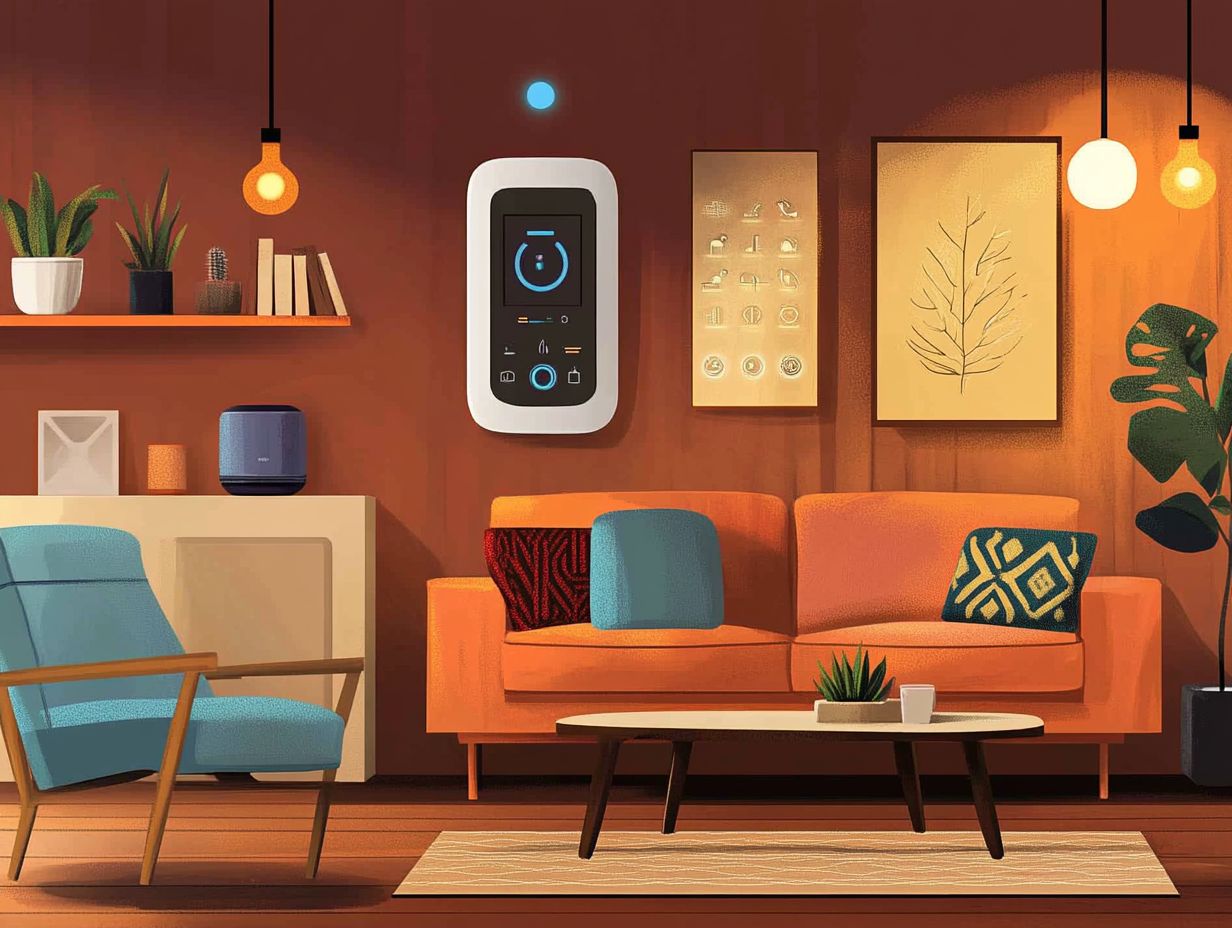
When choosing smart home devices, consider several key factors. Look at device compatibility, user-friendliness, and security features to ensure you make informed decisions.
Ensure your devices work well with smart home platforms like Google Home or Amazon Alexa. This guarantees seamless integration with your current setup.
User-friendly interfaces and strong security protocols are also essential. They protect your devices from potential vulnerabilities.
Compatibility with Existing Systems
Compatibility with your existing systems is crucial. It affects how well devices integrate and function together.
Many smart devices work best within specific ecosystems, like Google Home or Amazon Alexa. Understanding how to connect smart devices helps you choose the right hubs and devices.
For instance, a smart thermostat that works well with Google Home allows for intuitive voice commands. This enhances energy efficiency.
If you use Amazon Alexa, selecting compatible smart lights lets you create synchronized lighting scenes for any occasion.
Making informed choices significantly improves your user experience, leading to a more responsive home.
User-Friendliness and Control Options
User-friendliness is key when evaluating smart home devices. It affects how easily you interact with your systems.
Devices that support voice commands and have straightforward app controls enhance your experience. For example, a smart thermostat with an intuitive interface makes energy management simple.
This setup invites everyone in the household to engage with the technology.
Smart lighting systems that integrate with your home allow for easy customization via smartphone or voice commands.
These advancements ensure that smart technologies are functional and accessible, creating a comfortable living space.
Security and Privacy Features
When selecting smart home devices, security and privacy features should be at the forefront of your considerations. These technologies often handle sensitive data and connect to your home networks. For a comprehensive overview, consider exploring the smart home devices to enhance your living space. Therefore, it is essential to implement robust security measures such as network security protocols and multi-factor authentication.
This proactive approach can significantly alleviate privacy concerns. It ensures that your smart home remains a secure haven.
As you evaluate these devices, look for end-to-end encryption, a way to keep your data safe from prying eyes. Regular firmware updates are very important; they not only patch emerging vulnerabilities but also enhance the overall resilience of your devices.
Remote access controls let you monitor and manage your devices securely, effectively reducing the risk of unauthorized access. By prioritizing these elements, you can establish a robust security framework that safeguards your sensitive information and maintains the integrity of your connected home ecosystem.
Types of Smart Home Devices
Smart home devices encompass a wide array of types, each designed to fulfill specific functions that enhance home automation. From sophisticated smart speakers and energy-efficient thermostats to smart home devices for energy efficiency and intelligent appliances, the options are abundant.
By familiarizing yourself with the diverse range of smart home solutions available, you can make informed decisions on how to optimize your smart home setup as you curate your perfect smart home ecosystem.
Smart Speakers and Voice Assistants
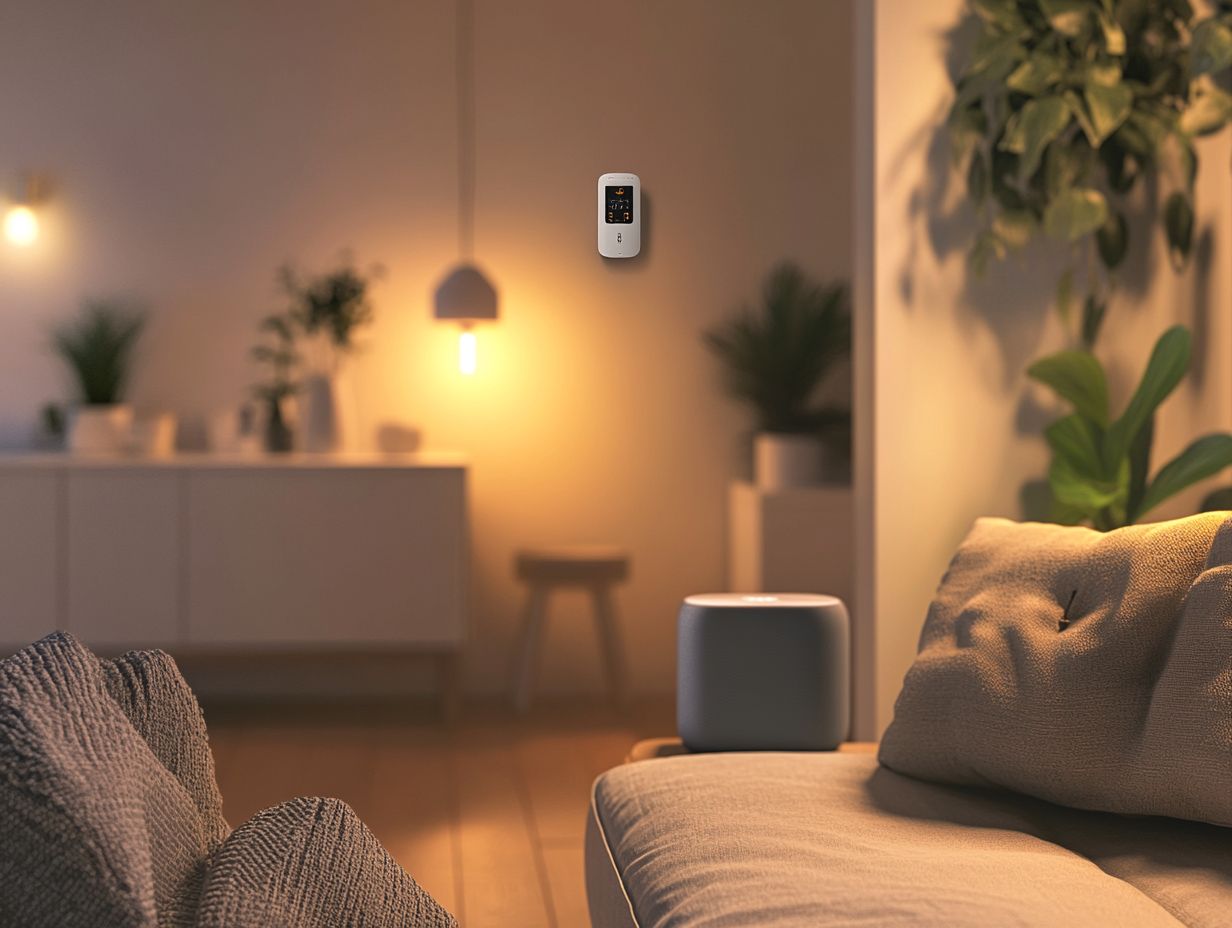
Smart speakers and voice assistants are the cornerstone of modern smart home technology. They allow you to control your devices with just your voice and interact seamlessly with your home ecosystem. Devices like Google Home, Amazon Alexa, and Apple HomeKit have made voice control not only popular but incredibly convenient.
These devices simplify operations and make your life easier. They ensure compatibility with a wide range of smart gadgets think:
- thermostats
- lights
- security cameras
- entertainment systems
all working in harmony. You can effortlessly adjust the ambiance of your home, check on security systems, or play your favorite tunes, all through simple voice commands.
Many smart speakers also integrate smoothly with third-party applications. This enables you to create personalized routines and smart home automations that adapt to your preferences over time. With continuous updates and advancements in AI technology, voice assistants are revolutionizing the way you interact with your environment. They offer you an exquisite blend of convenience and innovation.
Smart Thermostats
Smart thermostats are essential in the realm of home automation. They offer sophisticated energy management solutions that enable you to optimize your heating and cooling systems. With devices like Ecobee and Nest at your fingertips, you gain access to advanced features such as scheduling and remote control. This allows you to fine-tune your home s climate with ease and even save on energy costs.
Smart thermostats learn your preferences to keep you comfortable while monitoring energy consumption. They create schedules that suit your lifestyle. Their compatibility with various other smart home technologies think voice assistants and smart lights facilitates seamless integration, enhancing your overall experience.
By tracking real-time energy usage and delivering insights through intuitive apps, smart thermostats enable you to make informed decisions about your energy consumption. This not only has the potential to reduce your carbon footprint but also contributes to a more sustainable future.
Don t wait! Upgrade to a smart thermostat today for comfort and savings. Embracing this technology leads to cost savings and cultivates an intelligent, eco-friendly living environment that you can truly feel good about.
Smart Lighting Systems
Smart lighting systems, like Philips Hue, provide an advanced way to automate your home. You can control your lighting remotely or set it to adjust based on your preferences.
These systems enhance energy efficiency and allow you to create custom atmospheres for different activities or moods.
By integrating smoothly into your existing home automation platforms, smart lighting helps you manage your environment with ease. You can schedule lighting changes, sync with other devices, and adjust settings using voice commands through platforms like Amazon Alexa and Google Assistant.
Beyond convenience, these systems help you save energy by monitoring and adjusting your usage patterns.
With user-friendly interfaces often available through mobile apps, customization is easy for everyone no matter your technical skills allowing all to enjoy the benefits of smart lighting.
Smart Security Systems
Smart security systems are vital for improving your home security. By adding devices like security cameras and smart locks, you can protect your property with ease.
Brands like Ring let you monitor your home from anywhere and receive alerts about suspicious activity, ensuring your peace of mind.
These systems work together to enhance your overall home automation strategy. For instance, motion detectors can activate smart lighting when movement is detected, improving your safety at night.
Modern smart security systems often connect to voice assistants, allowing simple voice command control. Features like smart doorbells offer two-way audio and facial recognition, adding extra convenience.
All these components create a cohesive network that boosts both your security and your living experience.
Smart Appliances
Smart appliances are changing how you manage your household by integrating technology into daily tasks, from cooking to cleaning. These devices enhance home automation and energy management, allowing you to monitor your kitchen and laundry from virtually anywhere.
With features like energy monitoring and scheduling, these appliances help you reduce your carbon footprint while maximizing efficiency.
For example, smart refrigerators can track expiration dates and suggest recipes based on what you have, helping you cut down on food waste and save money. Likewise, smart washing machines adjust water usage based on load size, ensuring optimal energy consumption.
By providing real-time insights and remote control, smart appliances help you make better household decisions, leading to a more sustainable lifestyle.
Frequently Asked Questions
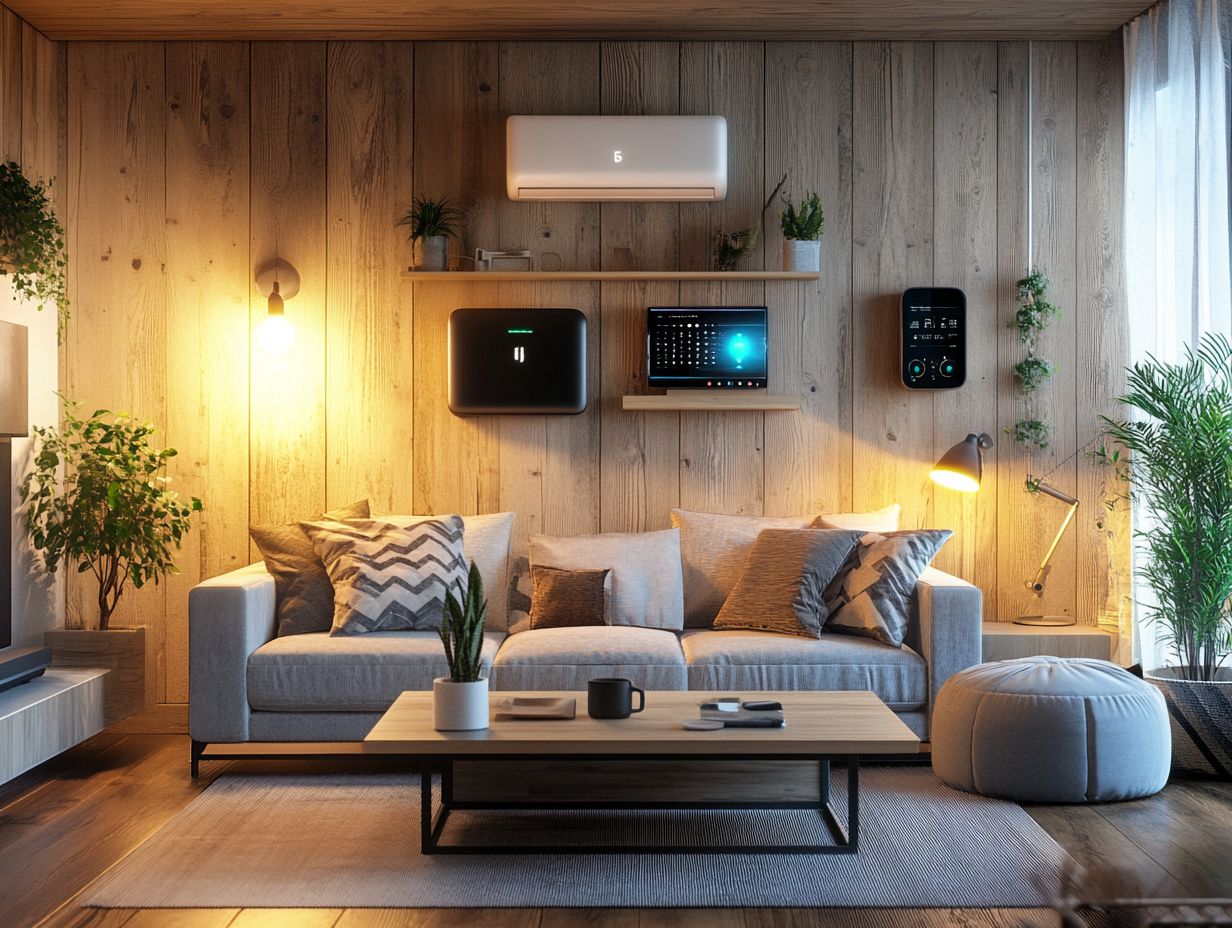
What are smart home devices?
Smart home devices are electronic items connected to the internet that you can control remotely through a smartphone, tablet, or voice command. They make your home more convenient, safe, and energy-efficient.
How do I choose the right smart home devices for my home?
First, identify your needs. Do you want to automate lighting, heating, or security? Next, consider your budget and how well devices fit into your existing systems. Research different brands and read reviews to discover the best smart home devices for your home.
What features should I look for in smart home devices?
Features vary based on your needs. Important aspects to consider include compatibility with your smartphone or virtual assistant, remote control options, and energy efficiency. Additional features like voice control and integration with other devices may also be beneficial.
Do I need a hub for my smart home devices?
It depends on the devices you choose. Some, like smart speakers and security cameras, connect directly to your Wi-Fi. Others may need a hub or bridge to communicate with each other and your network.
Explore these smart solutions today and transform your home into a tech-savvy haven!
How can I ensure the security of my smart home devices?
To keep your smart home devices secure, choose trusted brands and change the default passwords. Regularly update your devices to keep their software fresh.
Secure your home s Wi-Fi network with a strong password. Avoid using public Wi-Fi when controlling your devices remotely to reduce risks.
Can I add more smart home devices in the future?
Absolutely! You can add more smart home devices as long as they are compatible with your current setup.
Plan for future expansion by selecting devices that easily integrate with your existing system.

